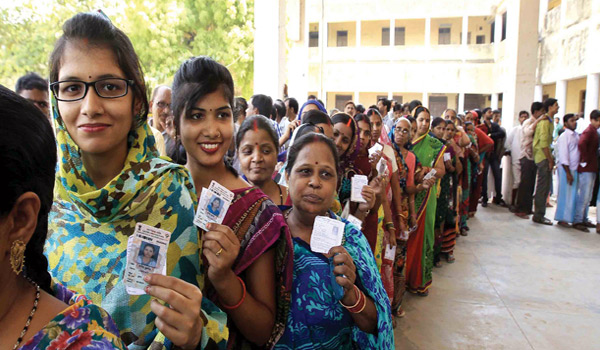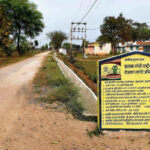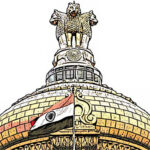To
Mr OP. Rawat, Chief Election Commissioner,
Mr Sunil Arora, Election Commissioner
Mr Ashok Lavasa, Election Commissioner
Election Commission of India,
Nirvachan Sadan, Ashoka Road, New Delhi – 110001
Dear Sirs,
Dated: 10 April, 2018
Subject : MEASURES TO ENSURE INTEGRITY & FAIRNESS IN THE FORTHCOMING PARLIAMENTARY ELECTION-2019 – REPRESENTATION THEREOF
This communication is being addressed on behalf of the Forum for Electoral Integrity, a non-political, not-for-profit, civil society coalition, having its office at # 21, Adhimoolam Street, Ponnappanadar Nagar, Nagercoil-629004, Tamil Nadu, of which I am the Convener.
The Federal Constitutional Court of Germany in a landmark judgment in March 2009 held the use of EVMs in Germany unconstitutional… The standard the Court set for this purpose was that there should be a provision whereby ‘the votes are recorded in another way besides electronic storage’ and there is ‘retraceability’ of the election result independently of the electronic count
-
- As is universally known, democracy is founded on the dignity of the human being. Election and its integrity are the essence of democracy. Integrity is described as “uncompromising adherence to moral and ethical principles; soundness of moral character; honesty”. If there is one area where this is badly absent in India, it is the electoral process through which political leaders are elected to govern the country.
- The core of electoral process is the voting system. There are broadly 5 types of voting systems in use around the world. They are indicated below in the descending order of transparency, examinability, verifiability, accountability and robustness:
- Paper Ballots that are hand counted.
- Machine-readable Paper Ballots that are scanned and electronically counted using Optical Mark Recognition (OMR) technology. A certain percentage of the Paper Ballots are also hand counted.
- Direct Recording Electronic Voting Machines (EVMs) with what is called Voter Verified Paper Audit Trail (VVPAT). The EVM does the machine counting and a certain percentage of the ‘paper slips’ are also hand counted.
- Direct Recording Electronic Voting Machines (DRE) that also do the counting electronically. Recounting is not possible because it will yield the same total.
- Internet-based Voting or Online Voting. This is most vulnerable to cyber-attacks and not suited for elections. India has so far tried out voting systems (i), (iv) and (iii) in that order.
- In a democracy, elections have to necessarily adhere to certain democratic principles. These are:
- All essential steps in the elections should be subject to public examinability;
- Ordinary citizens should be able to check the essential steps in the election process without special expert knowledge and
- There should be transparency in the counting of votes and ascertainment of the results reliably. Of the voting systems listed above only paper ballot satisfy these principles and EVMs do not.
- Federal Constitutional Court of Germany in a landmark judgment in March, 2009 held the use of EVMs in Germany unconstitutional. The Court ruled that in view of the “public rationale of elections”, the process should be transparent in a manner that the general public can be satisfied that their vote is correctly recorded. The standard the Court set for this purpose was that there should be a provision whereby ‘the votes are recorded in another way besides electronic storage’ and there is ‘retraceability’ of the election result independently of the electronic count. In effect, the Court ruled that EVMs are unconstitutional so long as there was no provision for an additional verifiable physical record of every vote cast. In the event all advanced democracies have abandoned EVMs and have returned to paper ballot.
- In Civil Appeal No. 9093 of 2013 and WP (C) No. 406 of 2012 on 8.10.2013 Supreme Court of India passed an order mandating the use of voter verified paper audit trail along with EVMs and directed the Election Commission of India (ECI) to implement the VVPAT system in a phased manner. The Supreme Court observed: “From the materials placed by both the sides, we are satisfied that the ‘paper trail’ is an indispensable requirement of free and fair elections. The confidence of the voters in the EVMs can be achieved only with the introduction of the “paper trail”. EVMs with VVPAT system ensure the accuracy of the voting system. With an intent to have fullest transparency in the system and to restore the confidence of the voters, it is necessary to set up EVMs with VVPAT system because vote is nothing but an act of expression which has immense importance in democratic system”.
- Supreme Court has repeatedly stressed that principles of democracy are a part of the basic structure of the Constitution of India. To this end, elections and the various different processes and mechanisms that undergird the universal adult franchise constitute a beacon of light. It is imperative, therefore, that every step be taken to preserve the integrity of the electoral process. Not only must elections be conducted fairly, but they must also be shown to be conducted fairly. In a republican democracy, such as ours, the rules that go towards the selection of the people’s representatives must partake the highest standards of fairness.
- Replacement of paperless EVMs with VVPAT EVMs is imperative for the following reasons:
- To impart confidence in citizens that their vote will be recorded and counted accurately.
- To allow for a recount.
- To provide a backup in cases of loss of votes due to malfunction.
- To test—through a sizable random selection of machines—whether the paper result is the same as the electronic result.
ECI has delegated a number of crucial functions regarding the conduct of elections —like manufacturing, checking and maintenance of EVMs—to the EVM manufacturers and other agencies over which it has little or no administrative control - It is our studied belief that the legitimacy of the electoral process in India, and, as a consequence, of democracy itself, today faces a grave threat. This is because the system of using EVMs has not only been repeatedly shown to be riddled with glitches, but also because insufficient steps have been taken thus far to allay these concerns.
- In fact, ECI has delegated a number of crucial functions regarding the conduct of elections—like manufacturing, checking and maintenance of EVMs—to the EVM manufacturers and other agencies over which it has little or no administrative control. The Commission lacks the technical capability necessary for exercising effective technical control. It seems to have reposed blind trust in these myriad players and has no means of verifying if they are playing foul. These personnel have also become ‘insiders’ along with the various election officials, and ECI’s lax control over them makes ‘insider frauds’ easier to commit and difficult to detect. ECI must assume greater administrative and technical control over the 2 EVMs manufacturers and related agencies in so far as the manufacturing, checking and maintenance of EVMs are concerned.
- In our opinion, there is scope for ‘insider frauds’ at three stages:
- At the EVMs manufacturing stage.
- At the district level, during the non-election period, when the EVMs are stored in archaic godowns in multiple locations with inadequate security systems.
- At the stage of ‘first level checks’ prior to an election when the EVMs are serviced by ‘authorised technicians’ from BEL and ECIL.
- Our apprehension has been confirmed in a RTI response received recently wherein against the figures provided by the ECI on the number of EVMs received, BEL and ECIL have submitted data with huge differences in the numbers they have supplied, at times ranging from several thousands to lakhs of EVMs, raising questions on “where the excess number of EVMs are going, what is being done with them”. This indicates that something very suspicious is going on between these organisations. It also reveals that EVM’s design and content are also being tampered with at will. The numbers revealed are stunning and shocking questioning the very integrity and credibility of the EVM based election.[See the Report at link: https://www.firstpost.com/
india/rti-reveals-contradictory-numbers-of-evms-fromelection-commission-suppliers-raise-question-mark-onpolls-4422967.html] - Although, pursuant to the 8.10.2013 order of the Supreme Court, your office has confirmed that all EVMs will be accompanied with VVPAT for the upcoming 2019 general elections, it is seen, as explained in your letter 13.2.2018 (published in ECI website) the chief electoral officers in all States and Union Territories have been directed to mandatorily verify VVPAT paper slips in only one randomly selected polling station in each assembly constituency. This defeats the very object of installing VVPATs in all EVMs which would be rendered nugatory tantamounting to non-implementation of Supreme Court Order.
- The main purpose behind the introduction of VVPATs is to bring in accuracy, verifiability and transparency in the casting and counting of votes. With the presence of VVPATs, voters can verify if their vote has been cast to the right candidate. Needless to say, it is only when the paper slips as verified by the voters are counted that the true purpose behind introduction of VVPATs is served. Without counting of VVPAT paper slips in a significant percentage of polling stations in each assembly constituency, the objectives of verifiability and transparency in the democratic process would remain unrealized.
- The direction to hand-count VVPAT slips in just ‘one polling station per Assembly Constituency’ worked out to 0.4% of EVMs in Gujarat and 0.9% of EVMs in Himachal Pradesh. Same was done in the North East and is now being repeated in the forthcoming Karnataka election. This is nothing but an exercise in tokenism. This would defeat the very purpose of introducing VVPAT and, what’s more, would also be fraught with all the risks of conducting elections with paperless EVMs. In the rush to declare results and the winners, the Election Commission cannot turn a blind eye to the possibilities of wrong totalling due to EVM malfunction or EVM tampering. Surely, in something as important as ensuring the integrity of the election process, a delay of a few hours or even a couple of days shouldn’t matter at all, more so when the entire election process, from the date of announcement to the date of counting, lasts for 2-3 months. Cost and time, we submit, cannot be considerations when the integrity of the entire electoral process is at stake.
- Moreover, the sample size of ‘one polling station per Assembly Constituency’ is statistically unsound not only in terms of its size but also because the various polling stations in the constituency are not similar and the sample drawn may not be truly representative of the constituency as a whole. There is an imperative need for stratified sampling with a random sample of one or more polling stations drawn from each of the following ‘strata’: urban; semi-urban; rural; those in remote hilly/desert/forest areas; those with very heavy voter turnout (> 80%); those with moderate voter turnout (50% to 80%); those with low voter turnout (<50%); those about which a large number of complaints were received, and so on.
- We, therefore, suggest that VVPAT slips must be simultaneously counted for a sample size of at least 25% of the polling stations in an Assembly Constituency with the samples drawn randomly from the different strata and verified with the electronic count. If any variation is found then the entire VVPAT slips in the constituency should be counted and tallied with the electronic count before declaring the result. We believe this is a direction that can be issued by your office for the upcoming 2019 general elections, in order to a greater standard of fairness and transparency in the electoral process.
- Apart from this fundamental suggestion, which we think is imperative to implement we would add some more that would strengthen electoral integrity and facilitate free and fair election leading to enhancement of voter’s confidence in the electoral process.
- ‘Trust but verify’ should be the Election Commission’s motto. It is our submission that the Election Commi-ssion must equip itself to exercise greater administrative and technical control over the two manufacturers and related agencies in whom trust has been reposed manufacture, check and service the EVMs. This oversight should be immediately put in place.
- ECI must consider engaging the services of a top electronic security firm of international standing (bound by a confidentiality agreement) to conduct periodic ‘ethical hacking and other modes of attack’ on its electoral systems and, in the processes, identify loopholes if any, and certify the robustness of the EVMs and the manner of their use.
- Just as counterfeit detector machines are imperative for verifying the genuineness of currency notes, the Election Commission must procure and supply one or more ‘Authentication Units’ to each district to help election officials verify whether the EVMs being used in their districts are genuine EVMs supplied by BEL/ECIL or counterfeit EVMs. ‘Authentication Units’ can not only detect and weed out the counterfeit EVMs, if any, in circulation, but they will also act as a deterrent because the knowledge of their existence ought to serve in driving away potential fraudsters. These ‘Authentication Units’ should not be manufactured by the present EVM manufacturers (BEL & ECIL) but by an independent third-party manufacturer. These ‘authentication verifications’ should be arranged by the District Magistrate-cum-District Election Officer (DM-DEO) in the presence of the contesting candidates after the ‘first level checks’ are over and before the date of polling. This is a change that can be put in place forthwith.
- Election Commission must completely overhaul the present method of storing EVMs during the non-election period. Election Commission should move towards a kind of “2-bin storage system” wherein the long-term storage of the EVMs in between two elections shall be in a few large, high-security, regional warehouses and the short-term storage immediately before or during an election in the current district warehouses; the Commission must invest in building two to five regional warehouses in each State depending on its size, which can serve as high security regional warehouses; The ‘first level checks’ of the EVMs and VVPATs that are carried out by the ‘authorised technicians’ of BEL and EVM before an election must be done only in these regional warehouses under CCTV and appropriate administrative safeguards against tampering; and the EVMs should be transferred from the regional warehouses to the district warehouses not earlier than 7 days before the date of polling. It is our considered belief that these suggestions can be implemented before the 2019 election.
- In the medium term, it is imperative that the EC switch over to Machine-readable Paper Ballots with OMR counting-cum-Hand counting of certain percentage of Ballot Boxes in place of the existing EVMs. We make this suggestion for two reasons: one, this will ensure that the abiding principle of the secrecy of the ballot is not compromised. And two, international practice shows a movement towards paper ballots because they are the simplest to understand; they are immune to all kinds of cyber attacks; there is no malware that can steal paper votes; and they can preserve the anonymity of the voter.
We, therefore, suggest that VVPAT slips must be simultaneously counted for a sample size of at least 25% of the polling stations in an Assembly Constituency with the samples drawn randomly from the different strata and verified with the electronic count. If any variation is found then the entire VVPAT slips in the constituency should be counted and tallied with the electronic count before declaring the result - An accurate recording of the democratic will of the electorate, to the satisfaction of the electorate, is indispensable to the democratic process. The exercise of the right to vote must take place in a manner that is in consonance with the highest principles of integrity and fairness as enshrined in the Constitution of India. Our suggestions, if implemented, will help instil in the electoral process greater transparency and fairness. We believe it is imperative that the EC implements our suggestions in order to ensure the sustenance of the principles of republican democracy that stand at the bedrock of the Constitution of India.

The Constitution of India (Article 324) mandates the ECI with the superintendence, direction, control and the conduct of all elections. What we are seeking is well within the powers of ECI and therefore immediately doable. In the event, we urge the Commission to issue the directions requested for expeditiously in the interest of Electoral Integrity which is the bulwark of Democracy. Though at Para (16) the 25% counting of VVPAT slips has been sought for the 2019 Parliament elections, ECI would be well advised to direct this for the impending Karnataka state assembly election if they are really serious about abiding by its constitutional mandate.
Thanking you,
Yours Truly,Sd/-
MG Devasahayam IAS (Retd)
Convenor, Forum for Electoral Integrity.
Mobile: 9940174446 ; Email: deva1940@gmail.com


























































